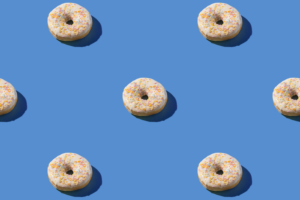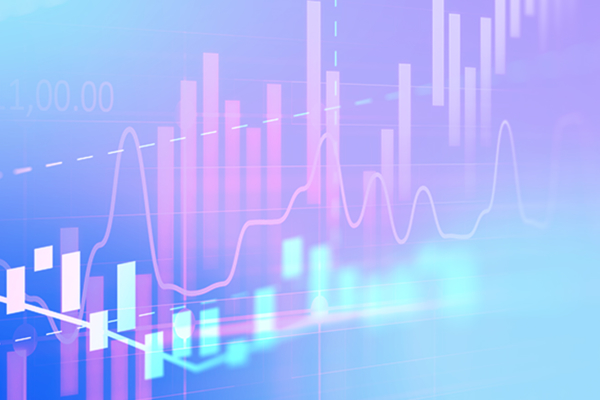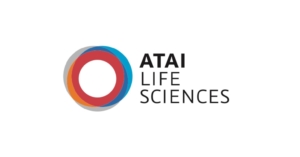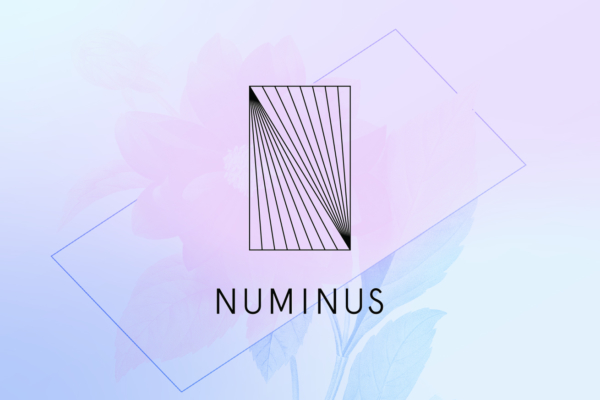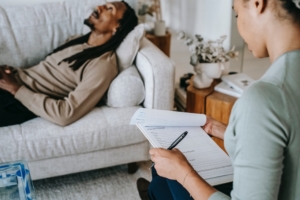
MindMed (Nasdaq: MNMD, NEO:MMED) finally gave the world a glimpse into its LSD-as-medicine project today.
Speaking at the highly anticipated PSYCH Symposium in London, researchers Prof. Matthias Liechti and Dr. Friederike Holze presented topline data of a Phase 2, double-blind, placebo-controlled study, attempting to treat anxiety disorders with LSD in 46 patients. Patients received 200 µg (micrograms) of LSD, which is considered a large dose.
The results were very positive, though perhaps not paradigm shifting — yet.
The primary endpoint of the study was the reduction in anxiety levels 16 weeks after the administration of LSD. They measured this using a questionnaire called the State Trait Anxiety Inventory, better known by its acronym STAI. In short, a person can have a score between 0 and 63, with the higher the score, the worse the anxiety.
The study found that 65% of patients saw their anxiety levels drop by at least 30% from where they were before treatment, 16 weeks after dosing. This compared to only 9% of patients in the placebo arm reaching that 30% level. The average reduction in the STAI was 16.2 points.
Importantly, there was only one serious adverse event in the trial, which consisted of “acute transient anxiety and delusions” during the LSD experience. It does not appear that this patient had any troubles once the effects wore off. In sum, the administration of large doses of LSD appears to be very safe, even if one person did have a particularly bad experience during the dosing.
Furthermore, when looking at secondary variables that measure depression, anxiety and other major psychiatric symptoms (Hamilton Depression Scale, Beck Depression Index, Symptom-Check-List-90-R) the results “showed similarly rapid and sustained responses consistent with a lasting treatment effect.”
In sum, according to MindMed, the topline data demonstrates “the significant, rapid, durable, and beneficial effects of LSD and potential to safely mitigate symptoms of anxiety and depression.”
There are a couple of very interesting aspects to this trial. First, this study was just measuring the efficacy of LSD in treating anxiety, not LSD paired with therapy. Up until this point, practically every psychedelic medicines clinical trial we have seen has been measuring the efficacy of psychedelic enhanced therapy, not solely the compound itself.
The fact that there was no therapy given during the dosing sessions — though they were overseen by trained therapists experienced with psychedelics— and there were no integration therapy sessions after the dosing, suggests that the LSD itself acted as a medicine, rather than a therapy enhancer.
This is fascinating, as it speaks to an open question in psychedelics research: If there is indeed a psychological benefit to taking psychedelics, where does it come from? Is it solely bio-chemical, changing the chemical make-up of the brain? Or does it make you more open, allowing for more effective therapy?
This study suggests the first analysis, though, that doesn’t mean that the therapy aspect is useless. In fact, it has been observed that therapy often enhances treatment options when using antidepressants such as SSRIs. Therefore we can hypothesize, though we would need data to back up this statement, that if therapy sessions were included in this study the results may have been even greater than 65% of patients seeing their symptoms improve by at least 30%.
Another interesting tidbit in the data release also hints at the source of psychedelics’ effectiveness. In their press release, MindMed stated, “Acute positive effects or mystical experiences significantly correlated with long-term therapeutic outcomes.” Though we have no information on this beyond the one sentence, it implies that the experience matters when using psychedelics to heal.
This is important, as another related question regarding the effectiveness of psychedelics is whether the so-called mystical experience plays a role, or whether a version of the drug with the same chemical effects but without the hallucination would be equally effective.
At this time, it is unclear if and when MindMed plans to release the full data from this study. Though the numbers released are very encouraging, it would be enlightening to see the full data set. For example, it would be nice to know the severity of anxiety suffered before the treatment, the remission rates (if this was measured), and whether anyone got worse as a result of the treatment, even if on average people got better. Full judgment will have to be withheld until we see the full data.
According to Dr. Miri Halperin Wernli, Executive President of MindMed, “These results represent the highest quality research ever conducted with LSD in anxiety disorders and provide contemporary confirmation of the preliminary findings of the anxiolytic and antidepressant effects of LSD in over 500 patients to date.”
Dr. Halperin Wernli continued, “The statistically significant, strong and long-lasting reductions in STAI-G scores, combined with similarly rapid and sustained responses in all secondary endpoint measurements, are extremely encouraging. These results further support MindMed’s clinical development strategy. We look forward to using these findings to advance our MM-120 program for the treatment of Generalized Anxiety Disorder.”
This year MindMed is set to begin a Phase 2b trial, attempting to treat Generalized Anxiety Disorder with LSD. This is important, since before we come to any firm conclusions on the effectiveness of LSD in treating anxiety, we need to see more and larger studies completed. We will also need to see studies measuring LSD against current treatments, such as SSRIs. Perhaps we should also see studies measuring the combination of LSD with SSRIs and therapy, as compared to any of the three alone.
MindMed is also working on trials using LSD to treat depression, cluster headaches, pain, and ADHD (in a microdose format).
In conclusion, the preliminary data released by MindMed is very exciting, but we need to see more studies before we can make a definitive conclusion. The results released, while very positive, were not earth-shattering. Hopefully in future trials we can see even more impressive numbers, for example getting the 65% of patients improving by at least 30%, to 65% improving by at least 50%. Perhaps this can be done by adding therapy during and after the sessions.
For now, as a psychedelic investor, I am very happy with the results, and I am excited to see what comes next for the company.
